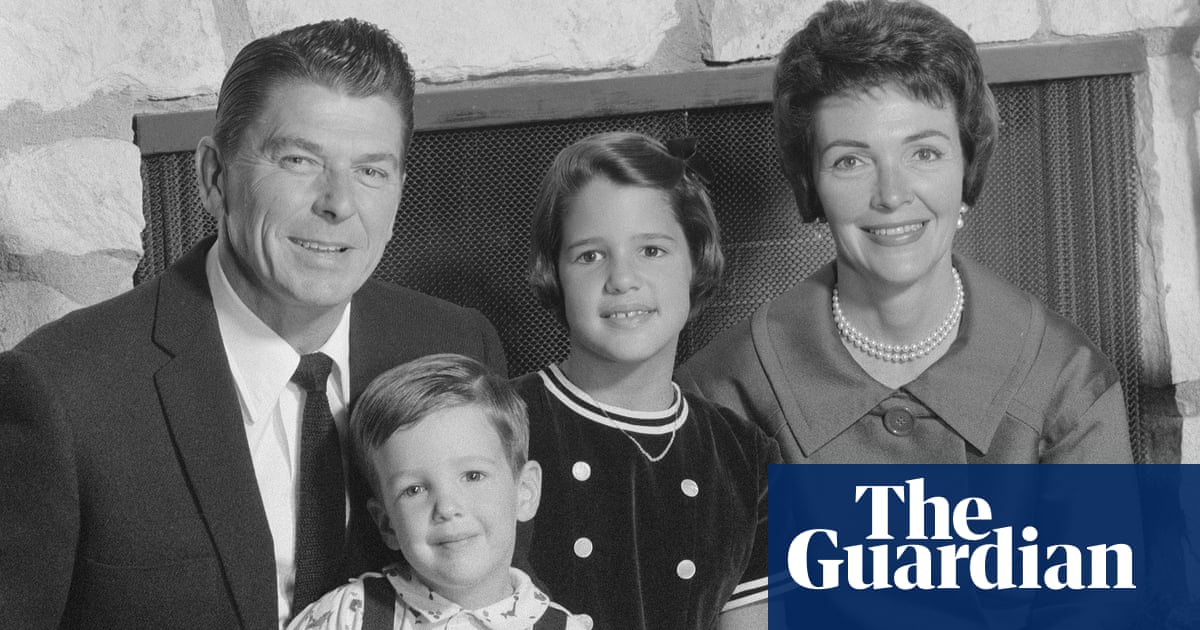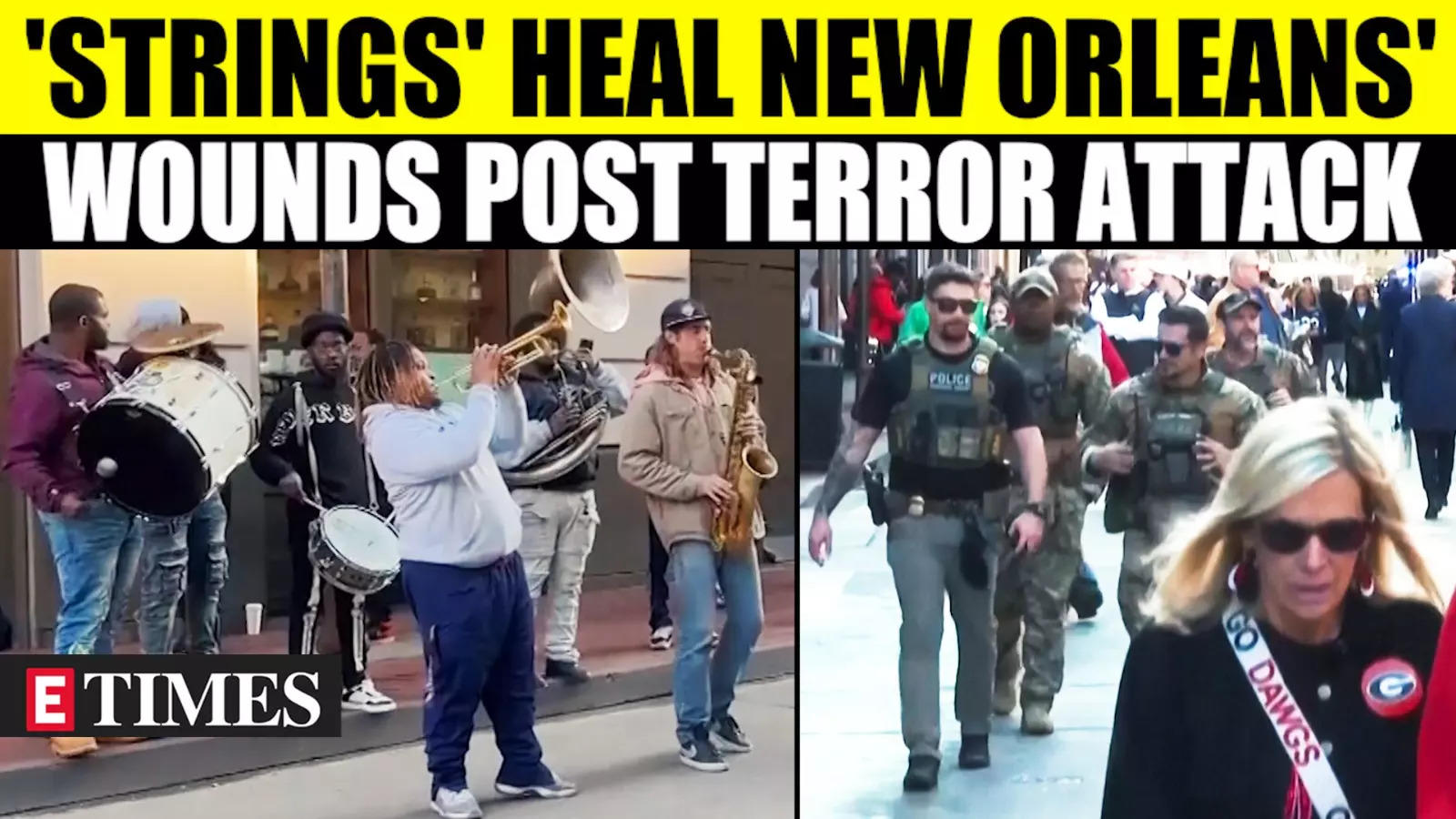When I ask Patti Davis what she’d like people to take from the new memoir she has written about her long and often mind-boggling family history, she has no trouble finding an answer. “You have a choice,” she says. “You can live as the person who you were … I did that for a long time – like, ‘Let me tell you what a victim I was, let me tell you how I was wounded.’ But we’ve all been wounded in some ways. And it’s not about going into denial about that – it’s about looking at it from a different perspective.”
From someone else, those words might sound like psychobabble. But in Davis’s case, they highlight what has arguably defined her life – trying to make sense of being the daughter of Ronald and Nancy Reagan – and a story that mixes politics and power with the more human themes of anger, emotional estrangement, damage and broken relationships.
Davis talks to me via video call from her home in Santa Monica, having just taken her dog for a very early morning walk. We begin at 8am, her time, and I wonder if it’s too early to plunge into the complex and often traumatic experiences that have been scattered through her 71 years. But, with bracing honesty and a warm sense of humour, she talks about them all: her lifelong sense of distance from her parents, her hugely difficult relationship with her mother, and how politics always threatened to remove her father from her life – something that reached a hideous extreme when he underwent an assassination attempt in 1981.
Davis has been writing professionally since the mid-1980s. In 1992, she poured seething anger about her family into The Way I See It, the autobiography she now calls “the book that shall not be named”. It was peppered with revelations and allegations – not least about her mother’s problems with prescription tranquillisers and bursts of violent rage, and her father’s questionable take on the Watergate scandal that ended Richard Nixon’s presidency: a “witch-hunt”, as he apparently saw it.
More than 30 years on, she has now tried to make amends with Dear Mom and Dad, which takes the form of a moving, elegantly written letter to her parents – intended as “a final chapter” in her family’s saga, which combines bracing honesty with glimpses of a closeness and warmth that, at one point in her life, she had seemingly almost forgotten. She was reminded of this part of the story, she says, while going through home movies that she had considered compiling into a documentary with the working title The Reagans Before the World Moved In, until she decided to use them as the starting point for the new book.
The most striking thing she saw centred on her mother. “My father had one of those roll-up screens and a projector,” she tells me. “We’d sit there in the living room, and he’d play these home movies. It took me a long time to look at them from a wider perspective and say, ‘Look – there was love there. My mother was really tender, seemingly getting a lot of joy out of this chubby little toddler paddling around like I was.’
“That’s part of our story, too,” she says. In its own modest way, this seems to have been a revelation.
Davis was born in 1952, 14 years before her father left behind his career as an actor and was elected governor of California, the office he held until 1975. Nancy – like her husband, a screen actor – was Reagan’s second wife. Two children from his earlier marriage to the actor Jane Wyman only became part of Davis’s life when she was eight, within limitations that often seem cruel: in the new book, she recalls that when the rest of the family went on shared summer vacations, her stepbrother Michael would be sent – alone – to summer camp.
Meanwhile, Davis’s own relationship with her mother was gradually consumed by Nancy’s habitual bursts of rage, and what the new book calls “arctic winters” of motherly disapproval. In one particularly bracing passage, Davis says that she cannot remember “ever walking into our home with a sense of security and a feeling that I belonged”. What life with Nancy did to Davis’s view of motherhood was symbolised by her decision, aged only 24, to opt for tubal ligation. She later described this as “a quick surgery that cuts and cauterises the fallopian tubes so that the eggs are stopped in their tracks”.
“I think it changed when my brother was born,” she says. That’s Ron, born in 1958. “My mother always did better with males than females. I was growing into a little girl and she had a new baby boy. So, you know, the tenderness got shifted there.”
Davis eventually learned about one key aspect of her mother’s backstory. Nancy’s mother, Edith Luckett Davis, had been a touring stage actor – and for six of her daughter’s formative years, she had been almost completely absent, leaving her in the care of an aunt and uncle. “Three to nine: that’s a very formative time in a child’s life,” Davis says. “And she was dumped with relatives who I believe she’d never even met before that. Her mother came back when she was nine and said: ‘Oh, I met this wonderful doctor. We’re moving to Chicago. You have a new father.’”
Did Nancy ever talk to her about any of that?
“No, never. My mother was such an expert at editing and redacting her own history. She would say: ‘Oh, you know, Mother had to go on the road and do her acting work. I completely understood.’ She was three. She didn’t understand anything, except: ‘Mommy just left me.’ But in her mind, she was an expert: she could just turn something around and make it what she wanted it to be.”
Dear Mom and Dad contains an even more horrific story about Edith Luckett Davis sexually assaulting her granddaughter: “It was always when no one else was around, so I knew I could never say anything about it and be believed.”
“I never spoke about that to anyone, for all the reasons that people don’t: it’s embarrassing and it’s shameful, and all of that,” Davis says now. “And I want to be really clear about the reason that I put it in this book: to say that this was why I didn’t go to her funeral service. But if I were the person then that I am now, I would have gone. That’s the point I was trying to make.”
That’s quite a thing to imagine yourself doing. Most people would not even consider it, would they?
“Exactly,” she says, before she explains what she means. “I think to rise above something that another person has done to you means that you can be the bigger person. You remember that person, and what they forgot about themselves: that they’re supposed to be kind and nurturing to people, that they aren’t supposed to touch children like that … So you are the bigger person and you remember that about them, right? Because they’re gone now. They’re going to have to atone for what they did on the other side.”
Did she ever tell Nancy about what her grandmother had done?
“I would never have told her.”
Why not?
“Well, first of all, she would have called me a liar. Although when I was writing this book, it suddenly occurred to me that I might not have been the first person my grandmother did that to. I mean, I’m not making an accusation. I don’t know. It’s entirely possible that a similar thing happened to my mother, but she would have blocked that out. And she never would have forgiven me for saying it. It just would have been too hurtful. Too damaging.”
Early in her life, Davis knew that her father – whose family history revolved around an alcoholic dad – had big political ambitions, and a set of very clear ideas. “There were lots of dinner table conversations about government being too big: ‘We’re being taxed too much and government’s too much in our lives.’ All I wanted to talk about was, you know, how this kid was bullying me on the school bus, and what happened on the playground that day. But he saw something that he didn’t think was right. And obviously, that grew and grew.”
When he was first elected president, in 1980, Davis – who had long since adopted her mother’s maiden name – was placed under the constant supervision of a security detail. By that point, she had moved in a very different direction from her parents, in terms of both her lifestyle and her politics. For a while, she lived with Bernie Leadon of the Eagles (they co-wrote I Wish You Peace, the closing track on the band’s 1975 album One of These Nights), and tended homegrown weed. Her chosen political cause, meanwhile, was ending the US’s arms race with the Soviet Union, which once led her to share a platform with the civil rights activist Jesse Jackson, who led 200,000 people in a chant of “Get a new president!” The memory is still clear: “I remember one of my secret service agents giving me this look – like, ‘You’d better get out of here right now.’”
Forty years on, her views on some of the most questionable aspects of Reagan’s political career are nuanced and complicated: as a matter of instinct, she wants to defend the father she loved, whatever their differences. But at the same time, she knows why some things he did – or failed to do – attracted such opprobrium.
When we talk about Reagan’s record on racism, she mentions clear memories from her childhood (people, he told her, “come in different colours … they are all God’s children”), and an episode in his first presidential term, when he and Nancy publicly stood alongside a black family in Maryland who had been targeted by the Ku Klux Klan. But she also acknowledges a taped conversation between her father and Richard Nixon made public in 2019, in which he used a vile racial epithet about African delegates to the United Nations. “I do believe that if my father had been confronted with that tape, then he would have apologised, and he would have felt awful,” she says. “That doesn’t excuse it, by the way. But that’s not the man I knew. That’s not the man who raised me.”
And then there is the mess of questions that swirls around how woefully late her father was to act on the Aids crisis. In many respects, she says, he and Nancy were less conservative than their reputation has subsequently suggested – in private, at least. “I grew up around gay people,” she says.
“There was a lesbian couple, Aunt Glesca and Aunt Emily. This was the time when all the parents’ friends were called aunt and uncle, you know … When my parents went on a vacation to Hawaii, they stayed at our house. They slept in my parents’ bed. I mean, to me, they were a married couple. So it was like nothing to me, and there were other gay people around. I wanted to give that perspective – that my father was not homophobic. My father was not insensitive to gay people.
“There were people in his administration who were very homophobic, who did believe that Aids was God’s wrath on gay people. And one of my father’s character flaws was that he delegated things to other people and didn’t really follow up. It was like, ‘Oh, we’re handling this …’ He just trusted that they would do whatever they were supposed to be doing.”
To that, there is an obvious rejoinder: the Aids crisis quickly became so clear that it was surely deeply remiss of him to delay action.
“Absolutely. I’m not excusing anything. For a man whose timing was usually pretty impeccable, his timing was wrong, every step of the way. I can’t sugarcoat that, nor would I ever try to. I simply wanted to explain that if anybody judges it as, ‘Oh, Ronald Reagan didn’t care about gay people’ – I don’t want you to think that. It was a whole mess of mistakes and failures.”
When I ask her about the looming US election, she refuses to engage with one subject in particular: “I’m not going to talk about the large orange man because I’m just so tired of it all,” she says. But she talks in mournful terms about her father’s respectful dealings with Democratic politicians, and an optimistic style of politics that she thinks has now gone. “I have no idea what my father would do about some of the issues that are facing us now. But I know how he would feel about the sort of demoralised weariness of this country. I feel like there’s something collectively broken in us … We’re seeing things being splintered away. And we hear very knowledgeable people talking about how fragile our democracy is and how easily it can fall apart and go away. And if it goes away, it’s not going to come back any time. Not in our lifetimes.”
In March 1981, Davis’s father was shot in Washington DC. The security services thought his family might also be assassination targets, and she was soon transported from California to the US capital by the military. “I remember being in this cavernous plane and we had headphones on because it was so noisy. I remember thinking, ‘If this is it, I’m never going to get to know my father.’ You have to remember: when we landed at two in the morning, all of us were just getting the news reports that everybody else was getting, that my father was still alive. But that’s all I knew. And then he got some kind of infection. So it was way more serious than people were told at the time.”
It was during this horrific episode that she once again caught a glimpse of ther mother’s emotional, vulnerable side. “I remember going into her room really early in the morning, like at dawn. And she was lying in their bed, clutching a shirt of his to her face, breathing in his scent.”
The longer we talk, the more I get the sense that these small, very moving recollections – capped by her father’s last 10 years, when he had Alzheimer’s disease – are what has finally allowed Patti Davis to make some sense of her past. “There was something my father told me from the time I was a child,” she says. “He said: ‘God put all of us here for a reason.’ And that has tugged at me my whole life.”
She pauses. “I don’t know why any of us were born to the families we’re born to,” she tells me. “I don’t know why any of us have the fate that some of us have. But I do know that we’re supposed to grow. And learn.”







